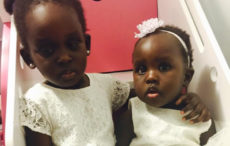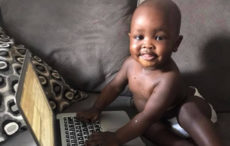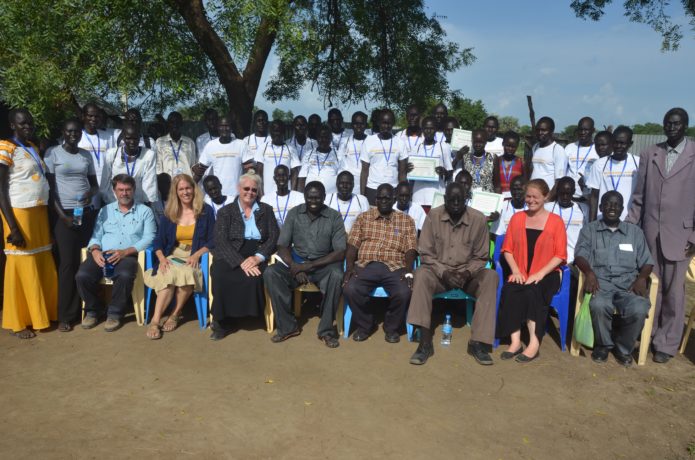Why I’m Still Wishing South Sudan a Happy Birthday
A letter from Michael Kuany
To all the supporters of Rebuild South Sudan and of me and my family, I greet you. I hope this finds you in good health. I know it has been some time since I’ve given an in depth update on my life and work. The last few years have been very full for me as I’m living in Australia with my wife, Deborah, and our three children: Ayak, Akuot, and Kuany. When I’m not with my family, I’m working to pay the bills and coordinating non-stop on my work with my community in South Sudan on Rebuild South Sudan projects.


This week seemed like a good time to share some thoughts with you because it is both the Independence Day of South Sudan (July 9) and the United States (July 4). On Saturday July 9, 2011, a nation was born, the Republic of South Sudan. This is the 193rd nation joined the global community. It was the first time in the Second Sudanese Civil War, Africa’s longest war, that the South Sudanese were given a voice. Ninety-eight point three percent of the populace turned out to vote for independence and a break from the North.
As the world’s youngest nation, the hopes of our citizens are persistent, and the eyes of the world are upon us. There are many challenges facing our nation, however it is the spirit of resilience that prevails in the South Sudanese people and reveals that we refuse to lose hope.
As Bishop Paride Taban, reminds us, everyone in South Sudan was part of the struggle and suffering: sons and daughters of South Sudan shed their blood for us to be free and to be able to claim our rights. Those who did not fight provided food and water for those who did fight, often going hungry themselves. No single tribe alone brought us to freedom, but it was all of us working together. Today we celebrate their sacrifice by taking pride in our nation and identity, as collegial participants in the global community.
Just the other day, the American people remembered the lives that were given to have a country they call home, today the South Sudanese do the same. Regardless of the political climates of our countries, the United States and South Sudan unite in recognition of how these days were brought about by the struggles and sacrifices of its people. Democracy is what we have fought for, the chance to have a voice. This day we honor the many voices of South Sudan, regardless of tribal differences and beliefs.
A few years ago, I wrote the following in an article called “Tears of Joy“: “There is no easy way to stability, there is hardship and that is what South Sudan has endured. As former civil rights leader Martin Luther King, Jr. once said: “Human progress is neither automatic nor inevitable… Every step toward the goal of justice requires sacrifice, suffering, and struggle; the tireless exertions and passionate concern of dedicated individuals” (Martin Luther King Jr).”
The hardships I have endured in my life are the driving force of my service to the South Sudanese people. I have dedicated my life to investing in this vibrant nation that still exists in the midst of crisis. Rebuild South Sudan is founded on offering children and families an opportunity to educate themselves and rebuild their home – a chance to dream and have a future.
My hope is that one day the children will no longer see themselves according to tribes but as South Sudanese, and that the many voices and cultures of this vibrant nation will be celebrated in harmony. Myself and Rebuild South Sudan work to enact what independence day commemorates – a nation strong together, a nation of peace and stability.
We must encourage South Sudan’s civil society, grassroots organizations and community organizations to be the central force in the nation’s diplomacy at national levels. As citizens, we must unify under our national identity as South Sudanese, and under our global identity as citizens of the world. South Sudan is a landlocked country rich in oil, agricultural production, wildlife and many unprocessed minerals, however due to long-term conflict citizens have rarely benefited from these resources. If we can heal from war, we can utilize these assets.
Our organization started by building a school, Pan Yach Primary school. While the school still needs walls and a floor, there are 573 children who go to school under the frame and roof. The war has made finishing the school difficult, but we have not given up. In December 2017, Katie Rivers, worked with the head teacher of the school, Yach, and a local Jalle youth, Yuot, to get an interview on video about what it’s like to teach at the school (see video below).
Last year in December, we started exploring how to support health in rural areas thanks to a partnership with Sarah Thebarge, an author and medical practitioner in San Francisco. As you can see in the video, we hosted a first aid training for teachers in Jalle and other places which are far from clinics. I was proud to be able to be there on the ground working with the teachers and community during this training.
We are exploring now the possibilities of sending in malaria medicine or other supplies for hospitals. Again, we, the South Sudanese, now have doctors and medical professionals, but the war has made supplies in the hospital difficult to come by. Last year we learned that the Bor State Hospital needs 8,000 treatments for malaria per year and they had none last December.
Even so, I’m very proud of Rebuild South Sudan and our dedicated team that has been working to host teacher training programs for teachers in our school and surrounding areas. That work is not only on developing professional skills but also on skills of peace.
I have always seen education as an avenue for peace, and that is becoming a reality. Trauma healing and non-violent communication were at the center of our 8-10 day trainings in 2015 and 2017, and each year, the teachers reported that those topics were the most helpful ones. We are now working on what is next as we partner with teachers in the area.

Jalle Elders and Leaders, 55 Men and Women who are Teachers, and the Teacher Training Team (Paul, Susan, Gail, and Katie)
Another thing that happened this last year: Katie, myself, and our new board member and Head of Operations on the ground, Michael Mayen, worked very hard to get the South Sudanese team on the ground operational. We are officially registered as Sustainable Hope and Development in South Sudan. This is part of my dream. Qualified South Sudanese people are actually doing the work to rebuild the nation. We have 5-7 people, men and women, who are the core of the team on the ground. You can meet them on our staff page on the website.
At the request of the elders in my community in Jalle, we are researching and developing a program for orphans and women’s economic skills. Many women in my community (as well as all across South Sudan) have been widowed by violence and are in need of sustainable incomes for themselves and their children.
South Sudan is often in the news for our tragedies, but I wanted to take some time to reflect on my work with my people, people who are still struggling to make a difference, people who are not just tragedy. There is still so much work that we can do even though there is a war. We can still work towards the health of our people, towards communities that listen to each other’s voices, towards a society that is fair and just and democratic.
I can’t thank you enough for being a part of this work with me, whether you were with us at the beginning or you are with us now.
Regardless of what is happening in the country right now, people still have hope and a country.
With Hope,
Michael






